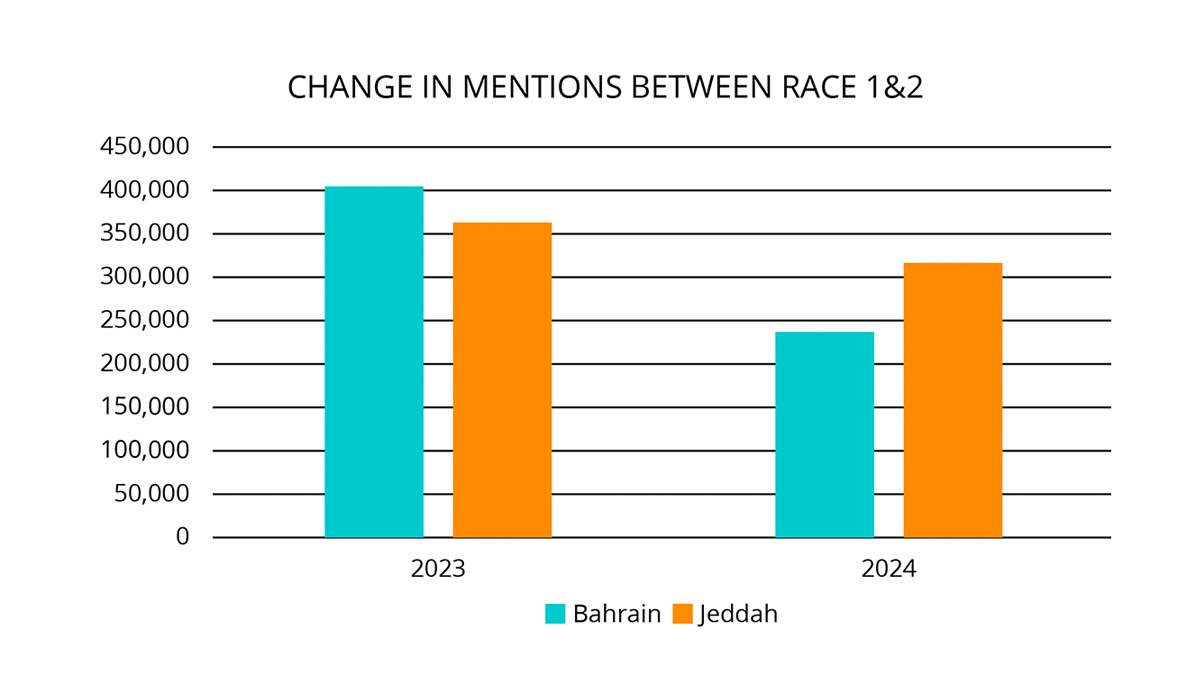
As regulars will know, we’ve been applying our team and tools to analyse social data in the world of Formula 1. Why? Because it’s a fantastic way of illustrating what social data can tell us about a particular audience and, also, because, well … we are die-hard motorsport fans and wanted to be able to legitimately talk about it at work. Part 1 of our recent report into F1 fandom, Have we reached peak F1 analysed millions of social posts from the past decade. The data suggested that the surge in excitement we’d seen since 2016 through to the first half of 2022 was now in decline, though a passionate and engaged fanbase around the sport still remained. We’re now two races into the 2024 F1 season, with Red Bull's Max Verstappen predictably winning both. Continued domination, as we know from the data and observation, is rapidly cooling audience interest in the sport — we felt it was a good time to do a quick check on the social data from the F1 audience.
How many people are talking about the races?
We found the volume of conversation using the hashtag “#F1” has continued to decline. There has been a significant drop in mentions of the Bahrain Grand Prix on X/Twitter, from 405,190 in 2023 to just 237,300 in 2024 — a 41.4% decrease. While some of this can be attributed to overall decreasing Twitter usage, it’s still a very significant year-on-year decrease. 
An increase in boredom
Our latest analysis confirms a growing disenchantment within the F1 fanbase. Positive sentiments around Bahrain dropped by ten per cent between 2023 and 2024, and the terms 'boredom' and 'boring' and phrases like 'can't be arsed' (CBA) have spiked in line with Red Bull’s dominance. What’s significant about this data is that, unlike the number of mentions, it can’t be explained by the drop-off in Twitter/X users in general — those users that are still on the platform aren’t enjoying the races as much. We found that during the first 11 days of March, across the past three years, complaints about the sport or races being “boring” and other sentiments related to boredom increased 3,800% from 2022 to 2024. This surge is echoed in sentiments around specific races, with mentions of boredom during the Bahrain Grand Prix rising from 130 in 2023 to 470 in 2024, almost tripling compared to the previous year. Interestingly, the data from the Jeddah race presents a more nuanced picture, with the surprise debut of Ollie Bearman providing a welcome boost in overall conversation volume and a significant reduction in negative conversation.
New audiences are turned off by continued dominance
Predictably, the increase in complaints about races being “boring” correlates strongly with Max Verstappen and Red Bull's dominance in the sport. When the race outcome becomes consistent, we can see a clear pattern in the social data: the excitement of racing starts to wane and newer fans struggle to adjust to the lack of drama. They complain and eventually drift away.
What can be done?
Sports thrive when they’re unpredictable and lose impact when they lack tension. F1 is in a difficult position, having invested a lot to attract new fans, and taking advantage of an epic 2021 title battle to engage a wide new audience. While that audience contains some new die-hards, it largely consists of casual fans who are now moving away from the sport due to the lack of on-track excitement. F1 could look at changing the regulations to curb Red Bull’s dominance, however the data tells us that fans don’t respond well to any perceived meddling or artificial adjustment in the rules. It’s a tricky spot to be in for F1 — make changes and they risk fans abandoning the sport in disgust, but leave things as they are and they risk fans wandering away. It’s going to be fascinating to see what the team at F1 decide to do … and whether their audience will follow where they lead. Click here to download the first two parts of our Driving Engagement report.
Patrick Charlton Published on March 13, 2024 10:36 am

